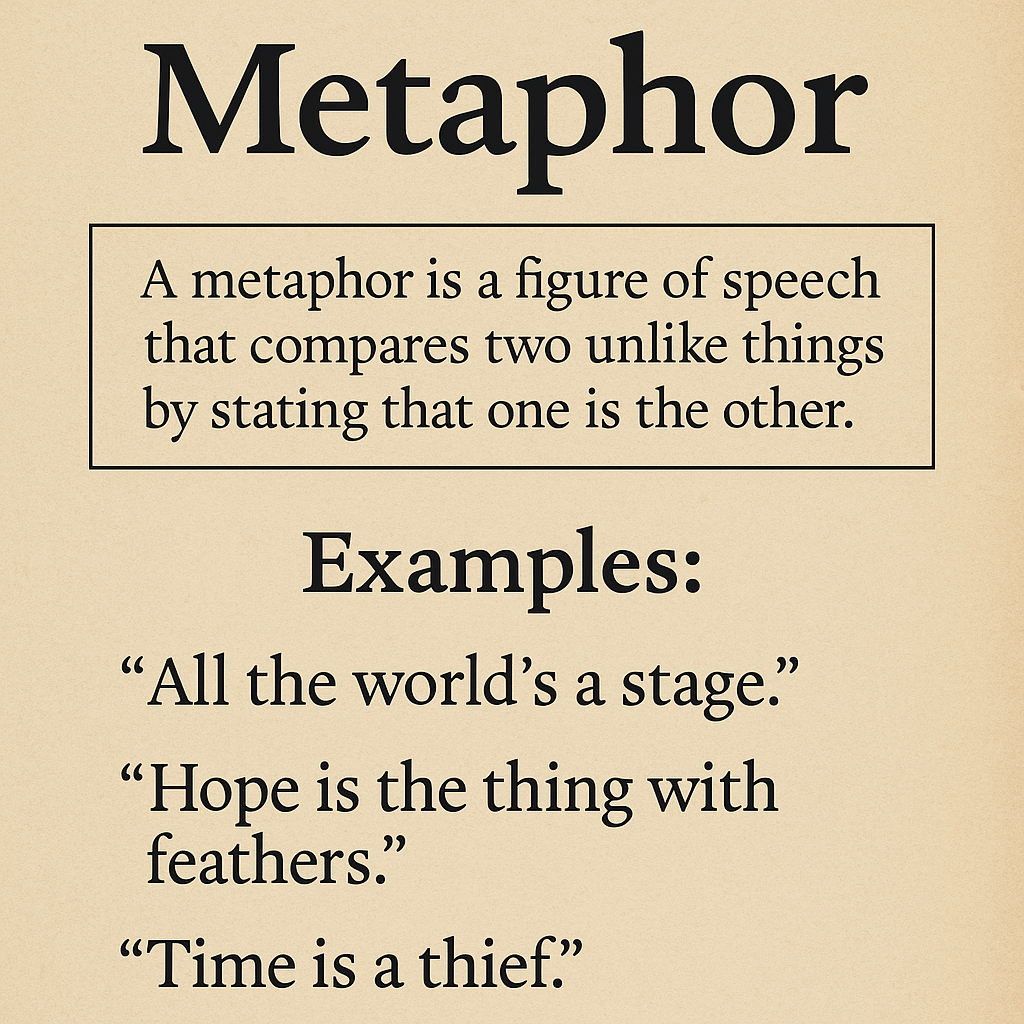What Is a Metaphor?
Metaphor is a powerful literary device. It directly compares two different things without using “like” or “as.” Instead of showing similarity, it claims one thing is another. Through this technique, writers create strong images and convey deep emotions. Unlike similes, metaphors feel bold and imaginative.
Why Do Writers Use Metaphors?
Writers rely on metaphors to enrich their language. Instead of explaining an idea in plain words, they create connections that feel alive. Metaphors allow writers to express feelings, moods, and concepts in a more meaningful way. Therefore, readers connect emotionally with the text. In both poetry and prose, metaphors add beauty and strength.
Examples of Metaphor in Literature
- “All the world’s a stage, and all the men and women merely players.” – William Shakespeare
→ Life becomes a stage. People become actors playing temporary roles. - “Hope is the thing with feathers.” – Emily Dickinson
→ Hope turns into a bird, light and free. It lives in the soul. - “Time is a thief.”
→ Time steals precious moments. It takes away life silently. - “The classroom was a zoo.”
→ The metaphor shows chaos. Children behave wildly, like animals.
How Do Metaphors Work?
Metaphors change how we view the world. By equating one thing with another, they reveal hidden similarities. Consequently, this sparks imagination and deeper understanding. Because of their visual and emotional power, metaphors improve writing instantly. In turn, they transform ordinary lines into unforgettable images.
How to Identify Metaphors
Identifying a metaphor takes focus. First, look for a direct equation between two things. Then ask: Are they different by nature? If yes, the phrase may be metaphorical. Finally, check whether the comparison creates a deeper meaning.
How to Use Metaphors Effectively
Using metaphors adds voice and clarity to your writing. To begin with, metaphors express abstract or complex ideas in vivid, relatable terms, making your writing more engaging. Therefore, choose fresh, original comparisons that reflect your unique perspective. Instead of using clichés like “time is money” or “a heart of stone,” craft metaphors that align closely with your theme. For example, personal growth could be compared to a tree reaching toward sunlight—an image that adds freshness and depth. Furthermore, match the tone of your metaphor with the mood of your piece; playful topics allow light metaphors, while serious subjects require thoughtful imagery. In addition, consider your audience—select metaphors they can easily understand and connect with. Ultimately, well-chosen metaphors enhance your style, stir emotion, and make your writing more memorable.
Famous Metaphors in Poetry
- “The moon was a ghostly galleon tossed upon cloudy seas.” – Alfred Noyes
→ The moon becomes a ship lost in stormy clouds. - “I am a lighthouse worn by the weather and the waves.” – Henry Rollins
→ The speaker becomes a lighthouse, worn by life’s storms.
Why Are Metaphors Important in Literature?
Metaphors help writers express what words cannot say directly. Moreover, readers engage more deeply with metaphorical language. In fact, through metaphor, abstract feelings take visible form. As a result, readers experience stronger emotions and clearer ideas.
Benefits of Using Metaphors
- Improve emotional impact
- Enhance creativity
- Clarify abstract thoughts
- Strengthen storytelling
- Create memorable images
- Deepen reader connection
Final Thoughts on Metaphor in Literature
Metaphor in literature transforms how we read and feel. In addition, writers use it to express beauty, pain, joy, and complexity. Because metaphors connect different ideas, they give writing a soul. Therefore, anyone who reads or writes literature must learn to appreciate and use metaphors. With practice, you’ll begin to see and apply them naturally.

Simile in Literature: https://englishlitnotes.com/2025/06/17/simile-in-literature/
Captain John Smith-A Pioneer of American Exploration and Literature: https://americanlit.englishlitnotes.com/captain-john-smith/
Use of Since and For in English: https://grammarpuzzlesolved.englishlitnotes.com/since-and-for-in-english-grammar/
The Commander and His Horse: https://englishwithnaeemullahbutt.com/2025/05/18/commander-his-horse/
Discover more from Naeem Ullah Butt - Mr.Blogger
Subscribe to get the latest posts sent to your email.
